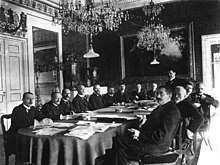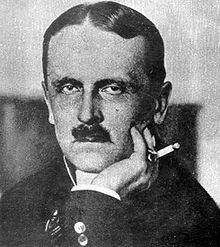Ulrich von Brockdorff-Rantzau
Ulrich Graf Brockdorff-Rantzau (born May 29, 1869 in Schleswig ; † September 8, 1928 in Berlin ) was a German lawyer and diplomat . In December 1918 he became the first German Foreign Minister to take office after the abdication of Kaiser Wilhelm II , and the first of the Weimar Republic . With the rest of Scheidemann's cabinet , which did not want to sign the Versailles Peace Treaty , he resigned in June 1919. In November 1922 he became ambassador to Soviet Russia .
Family and origin
Brockdorff-Rantzau came from the paternal family of Rantzau and mother from the Brockdorff , both from old Schleswig-Holstein nobility. The Rantzau family can be traced back to the 12th century. Four field marshals are among the diplomat's most famous ancestors. The well-traveled Johann Rantzau was governor in Denmark and attended Luther's appearance in the Reichstag in Worms, which made him a supporter of it. Daniel Rantzau , who fought for Denmark against the Swedes and was sung about by the national poet Adam Oehlenschläger , also went down in history. The most famous ancestor is the governor Heinrich Rantzau , who assisted three Danish kings and administered several duchies. B. Schleswig-Holstein, Wellingsbüttel or Wandsbeck. He also owned 6,300 books and worked as an art collector and author. While still in Versailles, the wall was decorated with the portrait of the French Marshal Josias Rantzau , who looked down on the German head of the delegation.
He lost his father, Hermann Graf zu Rantzau, a government assessor who died in 1872 at the age of only 32 at an early age. His maternal great-uncle, Ludwig Ulrich Hans Baron von Brockdorff (* 1806; † 1875), a former Danish envoy to Berlin, Madrid and Lisbon, and his wife Cäcilie , whose only child died in 1866, adopted the four-year-old Ulrich in 1873, who had the double name Brockdorff-Rantzau got. He inherited the Annettenhöh country estate near Schleswig from his adoptive parents .
According to contemporary witness reports, Brockdorff-Rantzau was considered a nobleman who, on the one hand, was open to new ideas, but, on the other hand, always considered himself to be part of the tradition of great ancestors and tried his whole life to emulate that fame.
Training and career in the empire
Brockdorff-Rantzau completed in 1888 to study law in Neuenburg , Freiburg , Berlin and Leipzig , which he in 1891 with the first legal state examination and the promotion of Dr. jur. finished. Between 1891 and 1893 he served in the Prussian Army with the 1st Guards Regiment on foot ; he was finally discharged as a lieutenant after an injury . In 1894 he joined the Foreign Office as an attaché . His first place of employment abroad was Brussels . In 1897 he was appointed Legation Secretary in Saint Petersburg , in 1901 he was appointed Legation Councilor in Vienna , where he later also served as Counselor . From 1909 to 1912 he held the post of consul general in Budapest .
In 1912, through the mediation of his mentor, the influential governor of Alsace-Lorraine Karl von Wedel , who had close ties to Scandinavia and had promoted Brockdorff-Rantzau since his time in Vienna, where Wedel had been ambassador , he was appointed German envoy in Copenhagen , where he officiated throughout the First World War . Without being explicitly authorized by Berlin to do so, he succeeded in this function in persuading Denmark to declare neutrality. During the First World War, together with the diplomats Rudolf Nadolny and Richard von Kühlmann , he pursued a policy of revolutionizing Russia , serving as the Foreign Office's liaison with Alexander Parvus . The intended internal destabilization of Russia was promoted by allowing Lenin to pass through Germany when he returned to Russia from Switzerland in 1917 . In January 1918 he brought Chancellor Georg von Hertling the offer of the Danish king to mediate between Germany and Great Britain, which was unsuccessful.
Foreign Minister and Ambassador to Moscow

In December 1918 Brockdorff-Rantzau took over the post of State Secretary in the Foreign Office after initial hesitation (from February 1919 first Reich Minister of Foreign Affairs of the Weimar Republic in the Scheidemann cabinet ). As a nobleman who took a decidedly democratic position, he should unite the competing currents of the country. In April 1919 he traveled to France as head of the German peace delegation to negotiate the Versailles Peace Treaty . Here he managed to get some changes to the text of the treaty presented by the Allies, including a referendum in Upper Silesia and the total amount of German reparations left open for the time being. However, the main objective of removing the war guilt article and the articles concerning the punishment of war criminals was not achieved. On May 7, he gave a speech in Versailles at the presentation of the draft peace treaty by the Allied and Associated Powers.
On June 20, 1919, he and the rest of the cabinet resigned because he did not want to sign what he saw as a “crime against Germany”. The new government under Gustav Bauer had to accept the treaty due to an Allied ultimatum. In the following two years Brockdorff-Rantzau repeatedly commented on the foreign policy of the young republic. He repeatedly called for the peace treaty to be renegotiated. He also advocated German-Russian rapprochement, but rejected the Rapallo Treaty because he saw it as an obstacle to further negotiations with the Western powers.
In November 1922 Brockdorff-Rantzau took up the post of ambassador in Moscow. In this function he tried to build up a good relationship with the Soviet Union , but at the same time to avoid Germany becoming too close to it. He vigorously opposed military cooperation between the two states, which brought him into conflict with the German army command. The ambassador made a significant contribution to the conclusion of the Berlin Treaty (1926) between the German Reich and the Soviet Union. In 1928, at the age of 59, he died unexpectedly of a stroke while visiting his brother in Berlin .
"I like to die, I already died in Versailles."
dig
The "last Bismarckian" is buried in Annettenhöh, Schleswig . Hidden and cut off by federal highway 76 , the grave is difficult to find and can only be reached via an unmarked forest path. It leads from the State Archaeological Office, the former manor house, on Brockdorff-Rantzau-Straße through a tunnel to the hill with the ingrown hereditary burial . His mother Juliane Gräfin zu Rantzau, nee. Countess von Brockdorff and his twin brother Ernst Graf zu Rantzau.
Others
The politician Walter Koch wrote in his memoirs:
“On February 6, I handed my credentials to the Reich Foreign Minister, Count Brockdorff-Rantzau, as no Reich President had yet been elected. This man - Count malgré lui as his enemies called him - had taken on a difficult task for entirely idealistic reasons and carried it out manfully as long as he could answer to his conscience. To his ministerial colleagues, such as Scheidemann, Bauer, Preuss, Erzberger, this inwardly and outwardly distinguished man sometimes formed a strange contrast. "
“Opinions were divided: in the government of the Reich, Count Brockdorff-Rantzau, who absolutely refused from the point of view of honor, faced the reckless optimist Erzberger, who was in favor of signing 'because things like this are never as bad as they look'. The rest of the members wavered between these two extremes, but tended to believe, considering that an end with horror is better than a horror without end. "
Fonts
- Patronage u. Compatronat. Dissertation. Leipzig 1890 to 1891.
- Documents. German Publishing Society for Politics and History, Charlottenburg 1920.
- Documents and thoughts about Versailles. Publishing house for cultural policy, Berlin 1925.
literature
- Edgar Stern-Rubarth: Count Brockdorff-Rantzau, wanderer between two worlds: a picture of life. Reimar Hobbing, Berlin 1929.
- Werner Conze : Brockdorff-Rantzau, Ulrich Karl Christian Graf. In: New German Biography (NDB). Volume 2, Duncker & Humblot, Berlin 1955, ISBN 3-428-00183-4 , p. 620 f. ( Digitized version ).
- Udo Wengst : Count Brockdorff-Rantzau and the foreign policy beginnings of the Weimar Republic. H. Lang, Bern 1973, ISBN 3-261-00880-6 .
- Leo Haupts: Count Brockdorff-Rantzau: diplomat and minister in the empire and republic. Muster-Schmidt, Göttingen 1984, ISBN 3-7881-0116-4 .
- Christiane Scheidemann: Ulrich Graf Brockdorff-Rantzau (1869-1928): A political biography. Verlag Peter Lang, Frankfurt am Main 1998, ISBN 3-631-32880-X .
Web links
- Literature by and about Ulrich von Brockdorff-Rantzau in the catalog of the German National Library
- Works by and about Ulrich von Brockdorff-Rantzau in the German Digital Library
- Newspaper article about Ulrich von Brockdorff-Rantzau in the 20th century press kit of the ZBW - Leibniz Information Center for Economics .
- Claudia Bannert, Kai-Britt Albrecht: Ulrich von Brockdorff-Rantzau. Tabular curriculum vitae in the LeMO ( DHM and HdG )
- Annettenhöh
Remarks
- ^ Klaus Schwabe : Brockdorff-Rantzau, Ulrich Graf von. In: Gerhard Hirschfeld , Gerd Krumeich , Irina Renz (eds.): Encyclopedia First World War. 2nd edition (UTB), Ferdinand Schöningh, Paderborn 2014, ISBN 978-3-8252-8551-7 , p. 392.
- ^ Ernst Johann (Ed.): Interior view of a war - German documents 1914-1918. dtv, Munich 1973, ISBN 3-423-00893-8 , p. 283 f.
- ↑ Address by the Reich Foreign Minister Ulrich Graf von Brockdorff-Rantzau when the Allied and Associated Powers presented the draft peace treaty - Versailles, May 7, 1919. Repeated by Ranzau 1920, archive SWR 2
- ↑ The Saxon Ambassador - Memoirs of Walter Koch (* 1870) from Dresden, Minister of Saxony in the National Assembly in 1919. on: dhm.de
| personal data | |
|---|---|
| SURNAME | Brockdorff-Rantzau, Ulrich von |
| ALTERNATIVE NAMES | Brockdorff-Rantzau, Ulrich Graf |
| BRIEF DESCRIPTION | first foreign minister of the Weimar Republic |
| DATE OF BIRTH | May 29, 1869 |
| PLACE OF BIRTH | Schleswig |
| DATE OF DEATH | September 8, 1928 |
| Place of death | Berlin |




